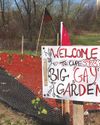
Canada’s population is aging, and we’re not prepared to offer people the death they deserve
On the first day of her nursing practicum at a long-term care facility, Jennifer Mallmes was tasked with bathing an elderly woman. It was silent when Jennifer entered the woman’s room and approached her bed. The elderly woman opened her eyes and asked Jennifer to brush her hair. Jennifer softly stroked the brush through the woman’s hair a couple of times. The woman said thank you, and then she died. Had it not been for Jennifer, she would have died alone in a dark, silent room.
In Canada, thousands of people die away from their homes and families in hospitals, hospices, and long-term care facilities each year. A disproportionately high number of them are women – 45 per cent of women die in nursing homes, compared to 29 per cent of men.
Women, historically branded as “caregivers,” provide 60 to 75 per cent of elder and life-limiting illness care. But when women themselves require end-of-life care, the central caregiving unit is down – women’s own needs are often considered secondary.
“I was angry for having been put in that position,” Mallmes recalls. “I was angry at the family for not being there. I was angry at myself for not having known what more I could have done for the woman in her final moments.”
Diese Geschichte stammt aus der September/October 2019-Ausgabe von Briarpatch.
Starten Sie Ihre 7-tägige kostenlose Testversion von Magzter GOLD, um auf Tausende kuratierte Premium-Storys sowie über 8.000 Zeitschriften und Zeitungen zuzugreifen.
Bereits Abonnent ? Anmelden
Diese Geschichte stammt aus der September/October 2019-Ausgabe von Briarpatch.
Starten Sie Ihre 7-tägige kostenlose Testversion von Magzter GOLD, um auf Tausende kuratierte Premium-Storys sowie über 8.000 Zeitschriften und Zeitungen zuzugreifen.
Bereits Abonnent? Anmelden

PLATFORMS FOR PEOPLE, NOT PROFIT
Digital platforms boast that they’ve “democratized” cultural production. But what would truly democratic platforms look like in Canada?

ORGANIZING THROUGH LOSS IN THE HEART OF OIL COUNTRY
The story of climate justice organizing in Alberta, at the heart of the tarsands, is the story of a group of young activists learning what it means to lose, and keep on fighting

GROWING THE LABOUR MOVEMENT
How unions are using community gardens to engage members, nourish communities, and help strikers weather the picket line

A NEW ERA FOR OLD CROW
In the Yukon’s northernmost community, the Vuntut Gwitchin First Nation is reckoning with how to preserve their land and culture, amid a warming climate and an influx of tourists

“At Least Hookers Get Wages”
The risky business of sex work in the gig economy

The Literal – And Literary – Futures We Build
Briarpatch editor Saima Desai talks to two judges of our Writing in the Margins contest about Idle No More and MMIWG, ethical kinship, writing queer sex, and their forthcoming work.

The Cost Of A T-Shirt
In Honduras, women maquila workers are fighting back against the multinational garment companies that they say are endangering their health and safety.

Milking Prison Labour
Canada’s prison farms are being reopened. But when prisoners will be paid pennies a day, and the fruits of their labour will likely be exported for profit, there’s little to celebrate.

Bringing Back The Beat
In mainstream media, labour journalism has been replaced by financial reporting and business sections. But journalism students are raising the labour beat from the grave.

There's No Journalism On A Dead Planet
Corporate media owners are killing local newspapers – which is making it impossible for everyday people to understand the on-the-ground impacts of the climate crisis